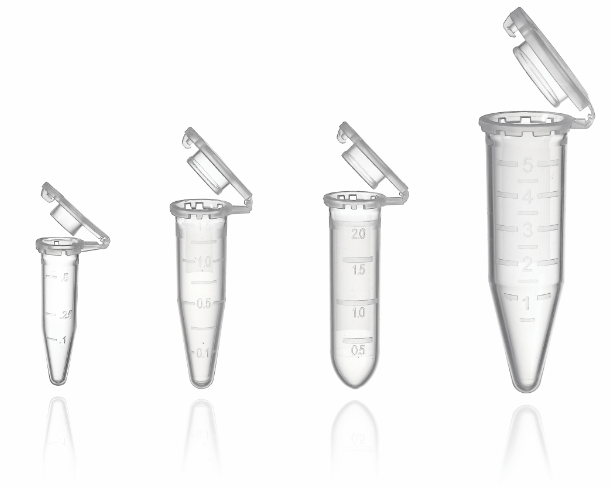What is centrifuge test tube?
Centrifuge test tubes play a crucial role in the operations of scientific and medical laboratories. Usually centrifuge tubes are cylindrical containers or vessels designed to hold liquid samples for centrifugation, a process used in various scientific and laboratory applications. These centrifuge tubes are typically made of plastic or glass and come in various sizes to accommodate different sample volumes and centrifuge machines. Micro centrifuge tube comes in a diverse array of types and designs, each tailored to specific tasks. The most prevalent variants are polypropylene and glass tubes, whereas specialized applications call for microcentrifuge, conical, and PCR tubes. These tubes serve a multitude of functions, including the separation of blood components, cell isolation from growth media, DNA and RNA extraction, and protein purification. To ensure precision and reproducibility in outcomes, it is imperative to handle, label, and dispose of centrifuge tubes correctly. Abiding by established guidelines, researchers and healthcare experts can optimize the efficiency and accuracy of their centrifugation procedures.
What are the features of centrifuge test tube?
Material: Centrifuge tubes can be made of various materials, with plastic (polypropylene, polycarbonate) and glass being the most common. The choice of material depends on factors such as the type of sample and the intended use.
Capacity: They are available in a range of sizes, from small microcentrifuge tubes (typically 0.5 mL to 2.0 mL) to larger conical tubes (15 mL to 50 mL) and even larger tubes (e.g., 250 mL) for specialized applications.
Conical bottom: Many centrifuge tubes have a conical bottom that allows for efficient separation of solids and liquids during centrifugation. The angle of the conical bottom can vary.
Screw cap or snap cap: Centrifuge tubes usually have sealing mechanisms, which can be screw caps or snap caps, to prevent sample leakage during high-speed centrifugation.
Graduations: Most tubes have volume markings or graduations on the side, which are useful for measuring and tracking sample volumes.
Transparency: Many centrifuge tubes are transparent, allowing visual inspection of the sample without opening the tube.
Sterility: Some tubes are designed for sterile applications and are individually wrapped to maintain sterility.
What are the uses of conical centrifuge tube?
Blood Component Separation: Medical laboratories frequently employ centrifuge tubes to segregate the different constituents of blood, encompassing the isolation of red and white blood cells along with plasma.
Cell Culturing: In cell culture procedures, centrifuge tubes play a pivotal role in isolating cells from their growth medium or in compacting cells following the harvesting process.
Extraction of DNA and RNA: Centrifuge tubes are instrumental in DNA and RNA extraction methodologies, enabling the separation of nucleic acids from other cellular elements.
Purification of Proteins: Centrifuge tubes are integral in protein purification processes, facilitating the separation of proteins according to their molecular weight.

Centrifuge test tubes come in a diverse array of sizes, materials, and configurations. Among the most prevalent types are:
Polypropylene Tubes: These are the most ubiquitous centrifuge tubes, crafted from robust polypropylene plastic. They are obtainable in a range of capacities, spanning from 0.2 mL to 50 mL, making them an excellent choice for general-purpose centrifugation needs.
Glass Tubes: Glass tubes serve as a popular alternative to polypropylene tubes due to their resistance to chemical degradation and compatibility with high-temperature sterilization methods. They are particularly well-suited for applications requiring optical clarity, such as microscopy.
Microcentrifuge Tubes: Engineered as compact, cylindrical vessels, microcentrifuge tubes are tailored for use in microcentrifuges. Typically accommodating liquid volumes between 0.2 mL and 2 mL, they are an ideal choice for experiments with limited sample volumes, including PCR amplification.
Conical Tubes: Distinguished by their conical shape, these tubes facilitate the straightforward separation of samples. They are frequently employed in centrifugation procedures that necessitate the segregation of solid or semi solid substances from liquids.
PCR Tubes: PCR tubes are designed specifically for use in polymerase chain reaction (PCR) experiments. Constructed from thin-walled plastic materials that promote efficient heat transfer, they are available in various sizes to accommodate diverse sample volumes.
To recap, centrifuge tubes stand as indispensable assets in scientific and medical laboratories, serving the purpose of material separation contingent on density. An assortment of centrifuge tube types caters to specific applications, necessitating the judicious selection of the suitable tube for each distinct purpose. Prudent management and storage of centrifuge tubes, along with strict adherence to safety guidelines, hold paramount importance in guaranteeing precise and repeatable outcomes. Through meticulous adherence to these guidelines, scientists and healthcare practitioners can optimize the effectiveness and precision of their centrifugation procedures, thereby yielding dependable and insightful results.
Choosing the right centrifuge tube for a specific task is paramount. For instance, opt for glass tubes when optical transparency is a prerequisite, whereas polypropylene tubes are better suited for versatile applications. Likewise, conical tubes come into play when there’s a need to segregate solid or semi solid substances from liquids, whereas microcentrifuge tubes prove optimal for handling minimal sample volumes.
Undergoing strict quality control procedures, Yongkang Medical can provide high quality foam packaging 15 ml centrifuge tubes and 50 ml centrifuge tubes. Compared to other micro centrifuge tube manufacturers, Yongkang Medical has rich experience in manufacturing centrifuge test tube, our centrifuge tube: Clear scale mark, can be operated by one hand and has good sealing performance. If you have any questions, just contact us for 15ml conical tube and 50ml conical tube.